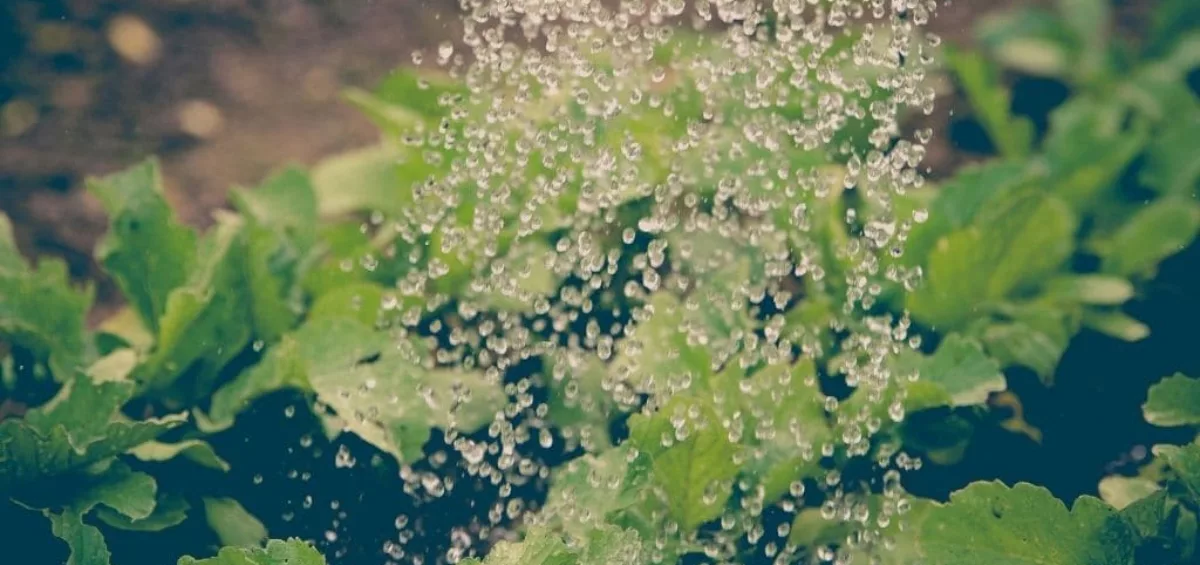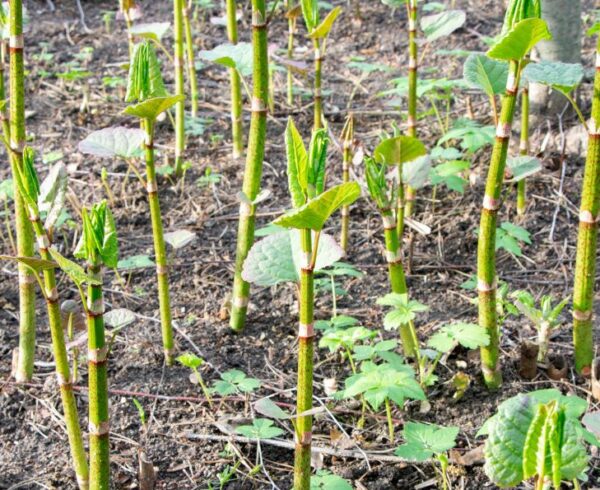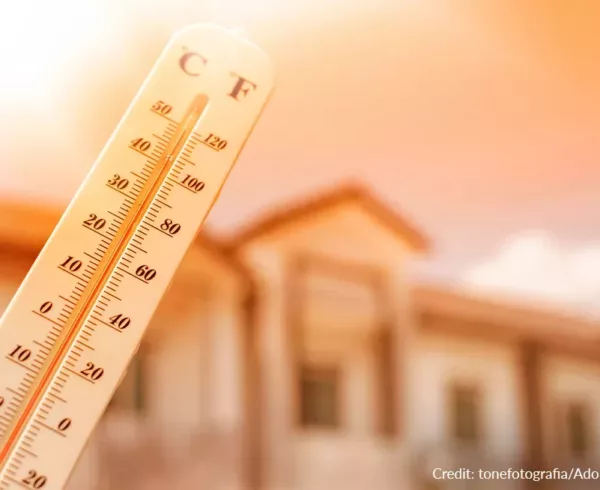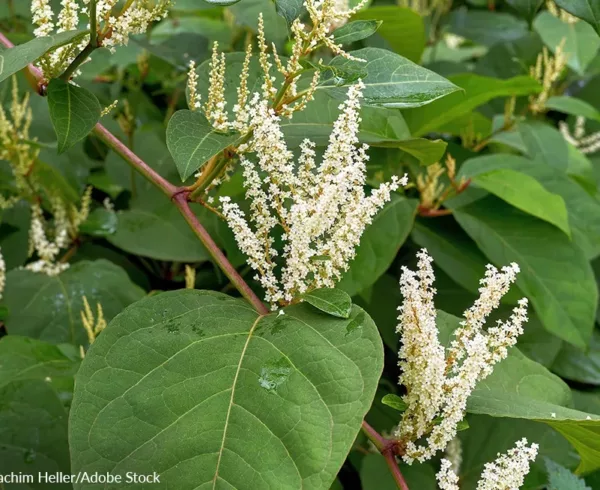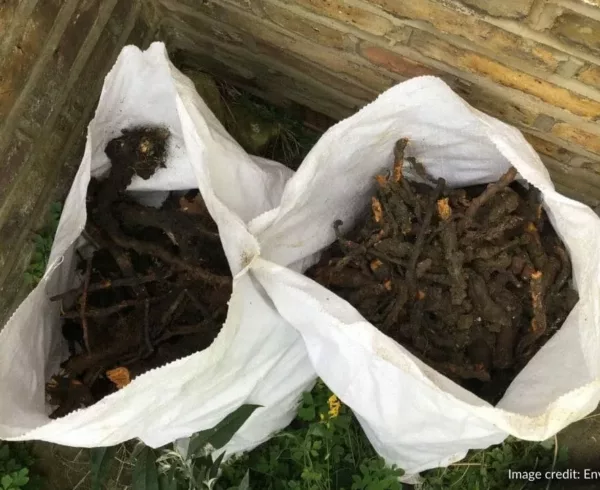Used since the mid-1970s, glyphosate is a substance commonly found in many herbicides and weed killers, the most popular of which is the weedkiller RoundUp, manufactured by the pharmaceutical company Monsanto. At present, glyphosate is not banned in the UK.
The use of glyphosate has sparked controversy in recent years with reports that the substance may potentially cause harm to humans, wildlife and nature.
Does glyphosate kill Japanese knotweed?
Glyphosate-based products are the only effective herbicidal treatment for Japanese knotweed, and their continued use is highly likely, at least until an effective and cost-efficient alternative method is found. Glyphosate-based herbicides are not just used for treating Japanese knotweed, but also for crops and plants across the globe. A 2016 paper estimated that enough glyphosate was sprayed in 2014 to cover every acre of cropland on the planet with more than 500 grams of the chemical. 500 grams is the equivalent to around half a litre of the herbicide.
Managing Japanese knotweed with a glyphosate-based DIY treatment plan is a slow process, often taking at least three or four growing seasons to fully eradicate, while the use of a professional contractor can half this time. Specialist knotweed removers may also be able to apply a glyphosate mixture using a stem injection technique, ensuring the surrounding flora and fauna are untouched.
These specialists may also have access to non-herbicidal and non-glyphosate-based methods of knotweed removal.
Is glyphosate safe to use?
At present, it appears that glyphosate is likely safe to use as a weedkiller if done so sparingly and, preferably, by trained professionals who know what they’re doing. The health concerns to humans linked to glyphosate-based weed killers are disputed, and most severe cases appear to involve prolonged daily exposure over several years.
Glyphosate-based products are currently the only viable way to control Japanese knotweed herbicidally and to ensure that it doesn’t regrow and continue to spread. This means its use is all but required until a suitable alternative becomes available.
As with other weedkillers, if you do use a glyphosate-based product like RoundUp, it is advised that you do not let pets like dogs and cats near sprayed areas until fully dry. This is typically around half an hour after the sprayed section looks visibly dry. Do consult the guidelines on the packaging or talk with your Japanese knotweed removal specialist for comprehensive advice.
For those looking to get rid of Japanese knotweed from their property, it is highly recommended to use a professional service rather than attempting to remove the troublesome plant yourself. Not only are specialists better placed to safely treat knotweed, but they’re also able to clear the plant once it has been exterminated and ensure that it doesn’t regrow. This involves unearthing and then legally disposing of the entire root system of the knotweed, which can potentially reside up to 3m underground. While you may be able to do all of this yourself, the process is highly complicated – requiring permits and authorisation from the Environment Agency – and could easily result in exponentially worse problems.
How to get rid of Japanese knotweed
An alternative to glyphosate treatment – An electric wand
One new method for eradicating knotweed comes in the form of a magic wand (or at least an electric wand) called the RootWave Pro. The device is being trialled by Transport for London and works by sending 5kV of electricity to zap the entire plant – roots included. The wand raises the temperature of the water inside the plant and effectively boils it from the inside, resulting in a clean and comparatively simple treatment process.
The RootWave Pro is currently still in its trial phase but looks to cost around £12,000. It also requires being connected to a large generator and transported using a 4×4 or similarly large vehicle.
While this device is not yet available for commercial use, it has been successfully tested in Exmoor National Park with remarkably positive results.
What to do if Japanese knotweed is growing on your property
Once you have identified Japanese knotweed growing on your property, it is vital that you do not allow it to spread. The presence of this plant can devalue a property by 5% on average and can make it impossible to sell. It can cause serious structural damage to buildings and can also open you up to the risk of legal claims if it spreads from your property to another.
If the knotweed has spread from neighbouring land to your property then you may be able to claim for the cost of removal alongside compensation from the party at fault.
Suppose the previous owner and/or surveyor employed failed to identify or disclose the existence of knotweed before you purchased your property. In that case, you may similarly be able to claim against them for the cost of removal and compensation.
More information on making a claim for Japanese knotweed removal.
The Japanese knotweed team at CEL Solicitors are on hand to guide you through the claims process. We work with professional Japanese knotweed removal companies to make sure the plant is removed effectively and efficiently. Professional companies are also able to give you an insurance-backed guarantee in the event the knotweed returns.


